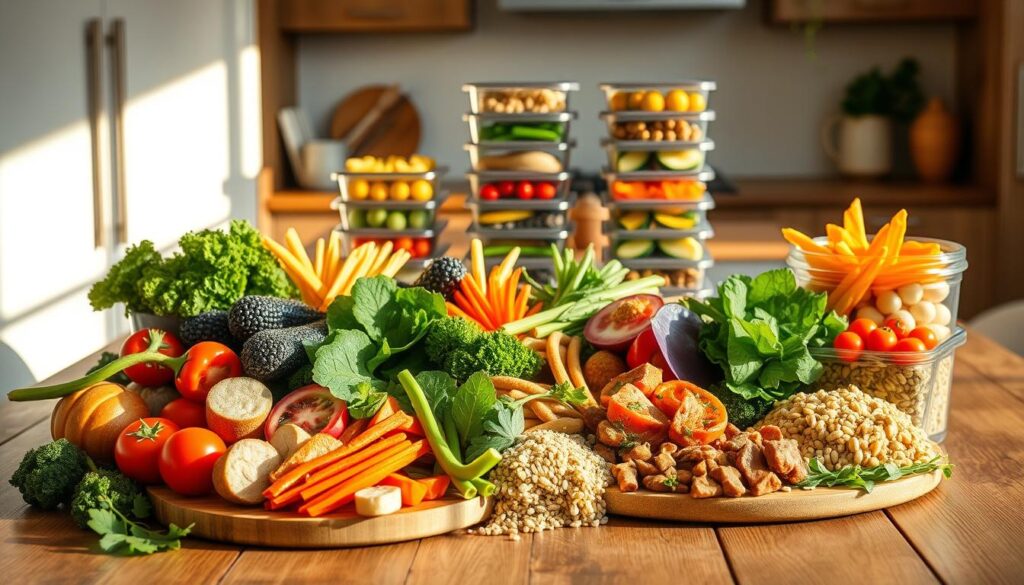Achieving and maintaining weight loss can be a challenging task, but with the right approach, it can become a sustainable journey. An effective weight loss meal plan is crucial for success.
The key to a successful weight loss journey lies in adopting a balanced and nutritious diet. By focusing on whole foods and a variety of nutrient-dense meals, individuals can achieve their weight loss goals and maintain overall health.
Key Takeaways
- A well-structured meal plan is essential for lasting weight loss.
- Focusing on whole, nutrient-dense foods is crucial.
- Consistency and patience are key to achieving weight loss goals.
- A sustainable eating plan leads to long-term success.
The Science of Sustainable Weight Loss Through Nutrition
The path to sustainable weight loss is paved with a deep understanding of how nutrition affects our bodies. Nutrition plays a crucial role in weight management, and understanding its impact is key to making informed decisions about our diet.
Why Most Diets Fail Long-Term
Most diets fail because they focus on short-term changes rather than long-term lifestyle adjustments. They often restrict certain food groups, leading to nutrient deficiencies and ultimately, a higher likelihood of regaining the lost weight. A nutritious diet plan for losing weight should focus on balanced eating rather than deprivation.
Metabolic Adaptations and Weight Management
Our metabolism adapts to changes in our diet, which can affect weight loss efforts. When we drastically cut calories, our metabolism slows down to conserve energy, making it harder to lose weight over time. Incorporating top recipes for weight loss that are nutrient-dense can help support metabolic health and sustainable weight loss.
By understanding these principles, individuals can make informed choices about their nutrition, supporting their weight loss journey and overall health.
The Best Healthy Eating Plan for Weight Loss
To achieve significant weight loss, it’s essential to focus on a balanced diet that incorporates the right foods. A well-structured eating plan not only helps in shedding pounds but also ensures that the body receives all the necessary nutrients for optimal functioning.
Optimal Protein, Fat, and Carbohydrate Balance
Protein should constitute about 15-20% of daily calories, helping to build and repair muscles. Healthy fats, such as those found in nuts and avocados, should make up 20-35% of daily intake, supporting heart health and satiety. Complex carbohydrates, like whole grains and vegetables, should account for 45-65% of daily calories, providing energy and fiber.
Nutrient-Dense Foods to Prioritize
Focusing on nutrient-dense foods is vital for a successful weight loss plan. These include leafy greens rich in vitamins and minerals, lean proteins like chicken and fish, and whole grains that provide sustained energy.
Meal Planning and Portion Control Strategies
Effective meal planning and portion control are key to maintaining a healthy eating plan. Opting for smaller plates and measuring portion sizes can help curb overeating.
A sample meal plan might look like this:
| Meal | Food | Portion Size |
| Breakfast | Oatmeal with fruits | 1 cup cooked oatmeal |
| Lunch | Grilled chicken salad | 4 oz chicken, 2 cups greens |
| Dinner | Baked salmon with quinoa | 6 oz salmon, 1/2 cup cooked quinoa |
By following these guidelines and incorporating a balanced diet with nutrient-dense foods, individuals can create an effective weight loss plan that is both sustainable and healthy.
Maintaining Results: Beyond the Diet Plan
To sustain weight loss, focus on developing habits that can be maintained over time, such as regular physical activity and a balanced diet rich in whole foods.
As you move beyond the initial diet plan, prioritize nutrient-dense foods, including fruits, vegetables, lean proteins, and whole grains. Be mindful of portion sizes and avoid restrictive eating patterns that can lead to nutrient deficiencies.
By adopting a balanced and varied eating plan, you can maintain your weight loss results and improve overall health. Stay hydrated, limit processed foods, and make healthy choices that fit your lifestyle.
FAQ
What is the most effective weight loss meal plan?
The most effective weight loss meal plan is one that is tailored to an individual’s nutritional needs, lifestyle, and preferences, focusing on whole, nutrient-dense foods, and maintaining a balance of optimal protein, fat, and carbohydrate intake.
How can I create a nutritious diet plan for losing weight?
To create a nutritious diet plan for losing weight, prioritize whole, unprocessed foods like vegetables, fruits, lean proteins, and whole grains, and consider working with a registered dietitian or using a reliable online resource to help guide your meal planning.
What are some top recipes for weight loss?
Top recipes for weight loss often feature lean proteins, roasted vegetables, and quinoa or brown rice, and can be found online or in cookbooks that focus on healthy eating; some examples include grilled chicken or fish with roasted vegetables, lentil soup, and salads with lean protein and healthy dressings.
How do I maintain weight loss results after completing a diet plan?
To maintain weight loss results, focus on making long-term lifestyle changes, such as regular physical activity, mindful eating, and continued healthy meal planning, and be sure to monitor your progress and make adjustments as needed.
What is the ideal meal plan for healthy weight loss?
The ideal meal plan for healthy weight loss is one that is balanced, varied, and tailored to an individual’s needs, and includes a mix of protein, healthy fats, and complex carbohydrates, along with plenty of fruits and vegetables.
Are there any specific foods that can help with weight management?
Yes, certain foods like leafy greens, berries, and fatty fish are rich in nutrients and antioxidants that can help support weight management, and incorporating these foods into your diet can be beneficial.

